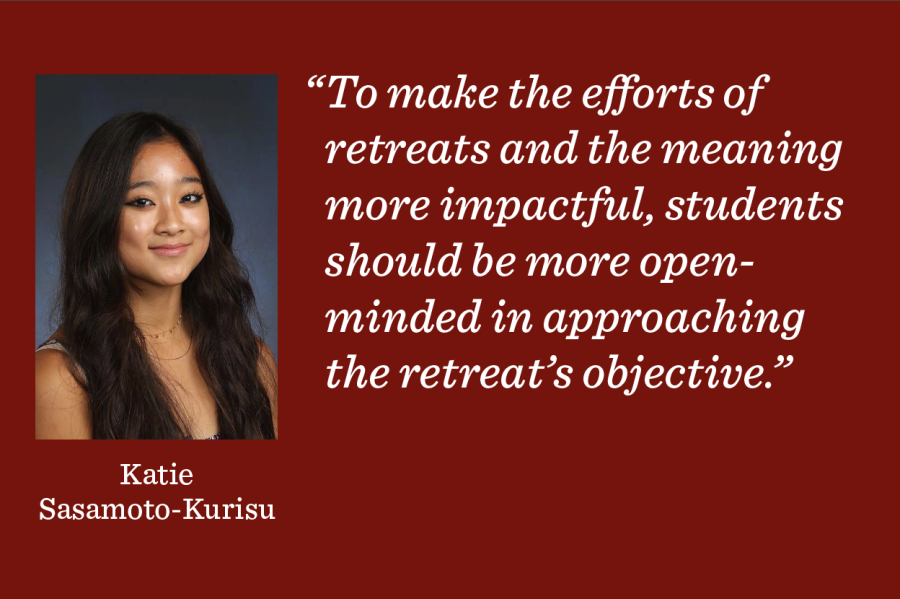Have an open mind toward retreats to maximize impact, growth
Midway Staff
Reporter Katie Sasamoto-Kurisu argues that students should enter retreats ready to be open-minded in order to foster growth and vulnerability.
June 7, 2022
Campers sitting around a wooded campfire and singing cheesy songs, students talking with each other admiring a national monument, and teens within a group getting ready to go skiing all have one thing in common: they are activities which thrive on social connection. In these cases specifically they form the foundation of retreats at school. Gradewide retreats at Lab are centered around specific core lessons in student development, community and peer connection.
To make the efforts of retreats and the meaning more impactful, students should be more open-minded in approaching the retreat’s objective.
While it is up to the administrators to determine the logistics and tasks of a successful retreat, adults should not be the only ones driving the direction of the experience. Allowing students to take personal initiative during their retreat could allow for more genuine interactions.
Students must be responsive, optimistic and at times, vulnerable. The willingness to get out of one’s comfort zone can be a really valuable trait, especially in an environment like that of retreats, one that brings together peers for a unique and genuinely constructive experience.
Beginning in middle school at Lab, students embark on designated multiple-day long trips with peers of the same grade as well as select administrators chosen to lead activities.
Often, older students will accompany the younger students to provide support and to establish and strengthen community across grades. This support cannot be effective unless students are ready and enthusiastic about interacting with peers in a setting outside the classroom; they engage in new and perhaps challenging collaborative activities like exploring a high ropes course, pitching a tent, working on a performance with others, and even learning about each other through deep conversations.
School retreats differ in that most participants interact with each other nearly every day. The periods of middle and high school are deeply socially formative times within an individual’s life, times that bolster and initiate personal growth. At a school like Lab, where activity is centered in a small community and strong continuity is established throughout the grade levels, it becomes easy for a student to stay reserved when it comes to new experiences; they may feel fearful of judgment from others and weary to engage, which is where a mindset shift would be beneficial.
A study conducted by the Journal of Youth Development revealed a significant impact in personal growth occurs from being in a camp environment. This setting was especially good at supporting social connection among campers thus increasing the social capital and proficiency of participants.
Being put into an environment such as this can be challenging but also very rewarding; the most successful camps are the ones in which participants are responsive and socially outgoing. Pushing past initial discomfort, like speaking first in planning an advisory dance routine or inviting someone new to the field game, can be very valuable for the cooperation of a group as a whole.
These insights have also been seen to apply to adulthood; in socially pushing oneself as a student, participants gain a wider comprehensiveness on how to interact with others later in life. In the same study, it was found that adults who attended camp as children found themselves having had personal growth through these experiences.
Consistent in the participants was self-determined behavior, like confidence as well as maintaining friendships and competency, much like enduring an hour of outdoor team building workshops. Other areas of strength included critical thinking, perhaps the ability to collaborate with peers in a productive way, and physical well-being, like an appreciation for the outdoors.
While the purpose of each retreat is not necessarily “campy,” the concept of each of these school trips and retreats is right in the name: they are a departure from normal life and normal activity, even just briefly. They require a special focus by the participants, a willingness to engage in new experiences and try new things.




























































